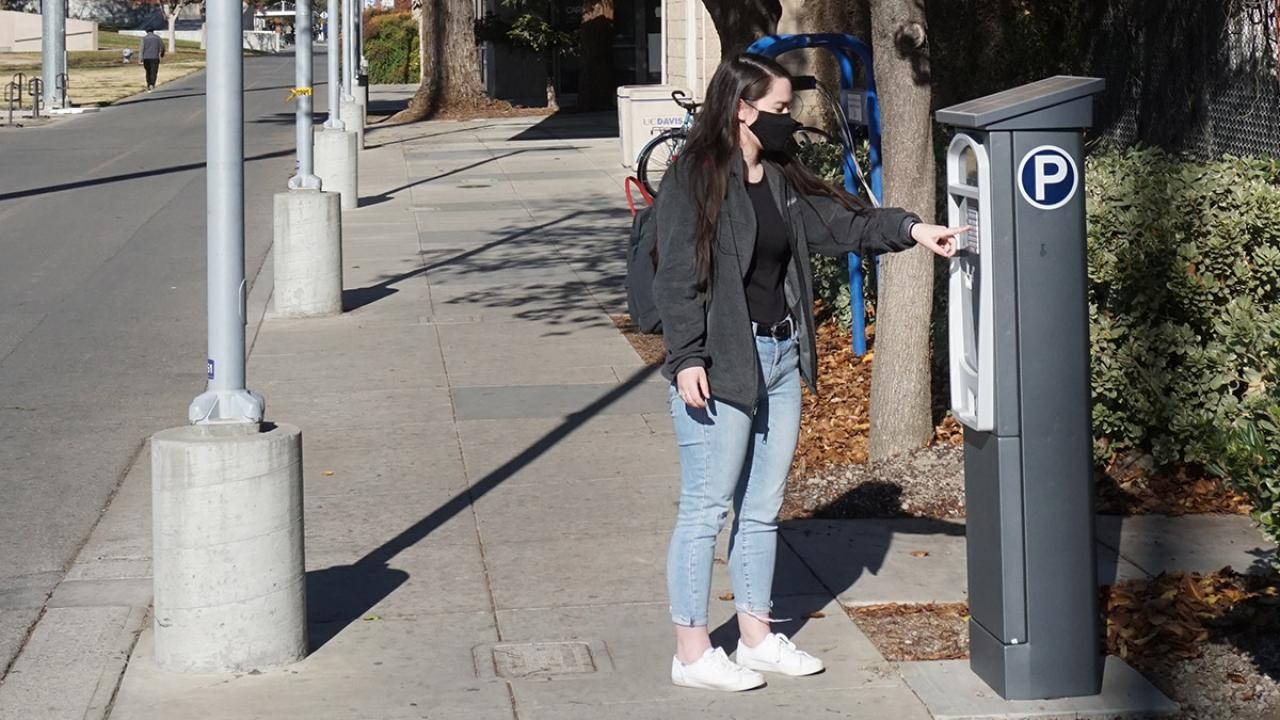Quick Summary
- In age of less commuting, you won’t be paying when you work remotely
- Instead of displaying a permit, you will enter your license plate number into payment system
- Enforcement vehicles will be equipped with license plate reader technology
Transportation Services is adapting the campus parking system to fit better in a world where employees and students come to campus only sporadically, swapping out long-term permits for daily fees.
The daily rates work out to be roughly the same, on a monthly basis, as what Transportation Services previously charged for short-term permits.
Starting Jan. 1 for students and July 1 for employees, physical permits will no longer be sold — drivers will pay daily in one of three ways: the ParkMobile app, by phone or by using new, solar-powered kiosks installed outside each parking structure and in six lots. Note: The kiosks charge visitor rates, so employees and students must use the app or pay by phone to get UC Davis affiliate rates.
“The changes 2020 brought to all our lives also brought drastic reductions to Transportation Services’ revenue, and these changes will both allow us to continue to be self-sustaining and to allow more flexibility to better serve our customers,” said Perry Eggleston, executive director of Transportation Services. He said parking lots on campus have gone from an average of 95 percent full to 20 percent.
As an auxiliary unit on campus, Transportation Services receives no funding from the university or the state, and all revenue earned through parking enforcement is put toward improvements to the parking system, as well as campus paths and roadways.
Transportation Services announced the following daily rates for campus affiliates for two parking categories: $3 for C areas and $2 for L areas.
THE FUTURE OF COMMUTING
Transportation Services will hold the third in a series of Transportation Tomorrow Forums, 3:30 p.m. Wednesday (Dec. 9), on the topic of “Building Tomorrow’s Commuting Program.” Register here.
That means someone who drives to campus five days a week for four weeks in a month would pay $60 for daily C permits (equal to the cost of a monthly C permit) or $40 for daily L permits (equal to the cost of a monthly L permit). Actual monthly costs for daily commuters will vary slightly, up or down, depending on how many workdays in a month.
But, add in a few remote workdays each month, and the amount paid not only drops, but Transportation Services gets closer to its long-term (prepandemic) goal of sustainable transportation by, in part, reducing the number of cars that come to campus each day.
Students must pay daily rates starting Jan. 1, while employees have the option to either pay daily rates or continue to use monthly parking permits up until July 1, when they must switch to the daily rates. Rates for daily A permits have not yet been set, and employees’ existing monthly permits will be valid through June 30. Employees will still be able to use pretax wages to purchase parking permits.
The daily rate for visitors will remain unchanged at $10 per day or $1.50 per hour (available near the Jan Shrem and Maria Manetti Shrem Museum of Art).
Enforcement
Vehicles will no longer have parking permits sitting on dashboards or hanging from mirrors, so Transportation Services will employ license plate reader technology for enforcement. Drivers will enter their plate numbers in the payment system, and the license plate readers will match what they “see” with the numbers in the payment system.
Because there are no physical permits to swap between vehicles, drivers with multiple cars can register each of their license plates in the ParkMobile app and choose which car they’re driving on a given day.
Other changes include doing away with separate motorcycle, vanpool and carpool permits. Carpool members will be responsible for splitting payment among themselves however they choose; Transportation Services suggests having each member register the carpool driver’s vehicle license plate in their own ParkMobile accounts and alternating payment.
